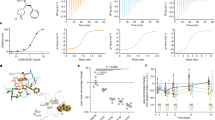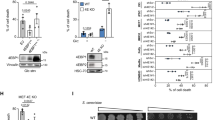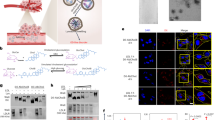Abstract
The type rather than the amount of dietary fat may be more important in breast carcinogenesis. While animal studies support this view, little is known about the effects of essential fatty acids (EFAs) at the cellular level. The MCF-7 breast cancer and the MCF-10A non-cancerous human mammary epithelial cell lines are compared in terms of growth response to EFAs and ability to incorporate and process the EFAs. Eicosapentaenoic (EPA, n-3) and docosahexaenoic (DHA, n-3) acids, presented bound to albumin, inhibited the growth of MCF-7 cells by as much as 50% in a dose-dependent manner (6-30 microM) in medium containing 0.5% serum. alpha-Linolenic (LNA, n-3) and arachidonic (AA, n-6) acids inhibited growth less extensively, while linoleic acid (LA, n-6) had no effect. In contrast, MCF-10A cells were not inhibited by any of the EFAs at levels below 24 microM. The differential effects of AA, EPA and DHA on MCF-7 and MCF-10A cells support a protective role of highly unsaturated essential fatty acids against breast cancer. The EFAs were primarily incorporated into phosphoglycerides. MCF-7 cells showed chain elongations and possibly delta 8 desaturation, but no AA was formed from LA, nor EPA or DHA from LNA. In contrast, MCF-10A cells desaturated and elongated the exogenous EFAs via all the known pathways. These findings suggest defects in the desaturating enzymes of MCF-7 cells. LNA, DHA and AA presented to MCF-7 cells in phospholipid liposomes inhibited growth as extensively as albumin-bound free acids, but were less extensively incorporated, suggesting different mechanisms of inhibition for the two methods.
This is a preview of subscription content, access via your institution
Access options
Subscribe to this journal
Receive 24 print issues and online access
$259.00 per year
only $10.79 per issue
Buy this article
- Purchase on Springer Link
- Instant access to full article PDF
Prices may be subject to local taxes which are calculated during checkout
Similar content being viewed by others
Author information
Authors and Affiliations
Rights and permissions
About this article
Cite this article
Grammatikos, S., Subbaiah, P., Victor, T. et al. n-3 and n-6 fatty acid processing and growth effects in neoplastic and non-cancerous human mammary epithelial cell lines. Br J Cancer 70, 219–227 (1994). https://doi.org/10.1038/bjc.1994.283
Issue Date:
DOI: https://doi.org/10.1038/bjc.1994.283
This article is cited by
-
Role of docosahexaenoic acid in enhancement of docetaxel action in patient-derived breast cancer xenografts
Breast Cancer Research and Treatment (2019)
-
Exosome-mediated microRNA signaling from breast cancer cells is altered by the anti-angiogenesis agent docosahexaenoic acid (DHA)
Molecular Cancer (2015)
-
α-linolenic acid and docosahexaenoic acid, alone and combined with trastuzumab, reduce HER2-overexpressing breast cancer cell growth but differentially regulate HER2 signaling pathways
Lipids in Health and Disease (2015)
-
Stearidonic acid-enriched flax oil reduces the growth of human breast cancer in vitro and in vivo
Breast Cancer Research and Treatment (2015)
-
Tissue fatty acid composition and secretory phospholipase-A2 activity in oral squamous cell carcinoma
Clinical and Translational Oncology (2015)



